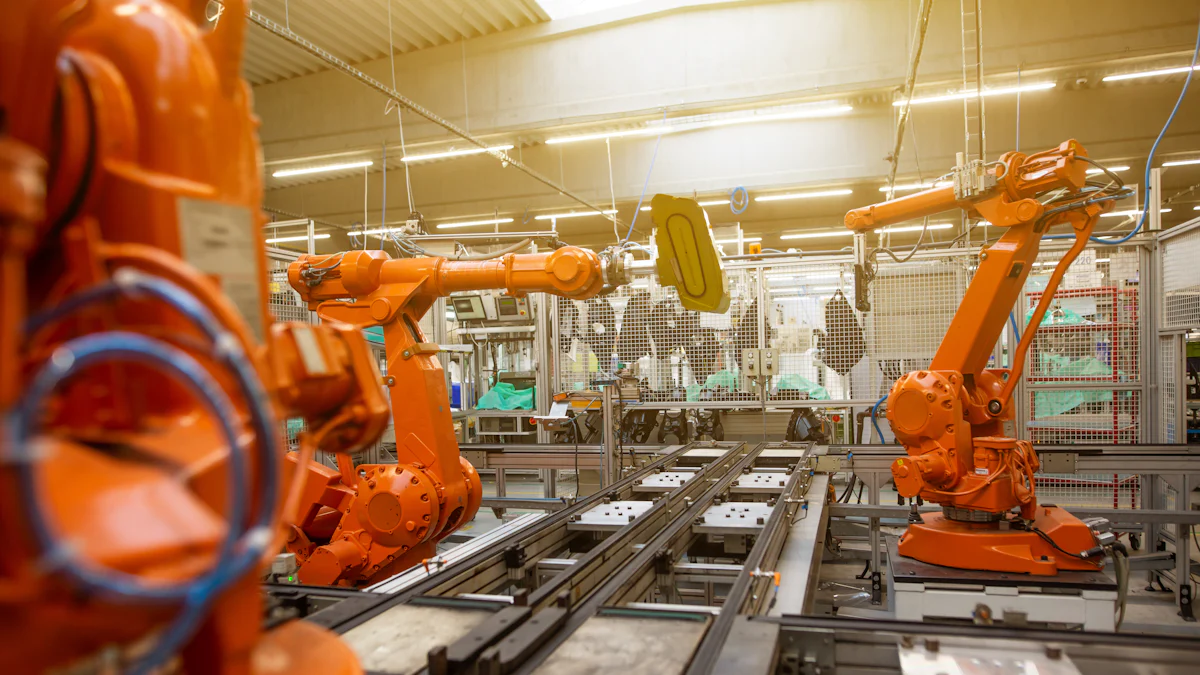Analyzing the Impact of Technology on Manufacturing

Technology has revolutionized modern manufacturing. The transformative effects observed in recent years have reshaped production processes. Advanced technologies like AI and IoT have enhanced efficiency and productivity. Understanding the technology manufacturing impact is crucial for future advancements. Industry 4.0 adoption has jumped by 80% since 2019. Manufacturing spending will reach $950 billion by 2030. Real-time data and production monitoring software enable manufacturers to transition to Industry 4.0 and beyond.
Evolution of Technology in Manufacturing

Historical Perspective
Early Innovations
The late 1700s in Britain marked the introduction of technological innovations. These advancements improved the production of goods and materials. Urbanization of small towns followed, creating more jobs for workers. The steam engine improvement by James Watt in 1765 stands as a significant invention during this period.
Industrial Revolution
The Industrial Revolution transformed manufacturing processes. Factories began to use machinery instead of manual labor. The creation of the first assembly line by Ransom E. Olds in 1901 increased output by 500% in one year. This period saw major evolutions in manufacturing linked to technological change.
Modern Technological Advancements
Automation and Robotics
Automation and robotics now dominate modern manufacturing. Machines perform repetitive tasks with high precision. This reduces human error and increases productivity. Industries benefit from consistent quality and faster production times.
Internet of Things (IoT)
The Internet of Things (IoT) connects devices and systems within factories. Real-time data collection and analysis become possible. IoT enables predictive maintenance and efficient resource management. Manufacturers can monitor operations remotely, ensuring smooth workflows.
Artificial Intelligence (AI) and Machine Learning
Artificial Intelligence (AI) and Machine Learning revolutionize decision-making in manufacturing. AI algorithms optimize production schedules and inventory management. Machine Learning improves quality control by detecting defects early. These technologies enhance overall operational efficiency.
Future Trends
Smart Factories
Smart factories represent the future of manufacturing. These facilities utilize advanced technologies for automation and data exchange. Real-time monitoring and self-optimization characterize smart factories. The transition to Industry 4.0 marks a significant step towards this future.
Advanced Materials
Advanced materials play a crucial role in future manufacturing. Innovations in material science lead to stronger, lighter, and more durable products. These materials enhance performance and reduce production costs. Manufacturers can create high-quality goods with fewer resources.
Sustainable Manufacturing
Sustainable manufacturing focuses on reducing environmental impact. Companies adopt eco-friendly practices and materials. Energy-efficient processes and waste reduction become priorities. Sustainable manufacturing ensures long-term viability and compliance with environmental regulations.
Technology Manufacturing Impact on Processes
Efficiency and Productivity
Reduced Downtime
Technology manufacturing impact has significantly reduced downtime in production processes. Automation systems detect potential issues before they cause disruptions. Predictive maintenance schedules equipment servicing at optimal times. This proactive approach minimizes unexpected breakdowns. Real-time monitoring systems provide instant alerts for any anomalies. Immediate responses to these alerts prevent prolonged halts in production.
Enhanced Precision
Advanced technologies have enhanced precision in manufacturing. Robotics execute tasks with exact accuracy, reducing human error. Computer-aided design (CAD) software ensures precise specifications. Automated machinery maintains consistent quality throughout production runs. Enhanced precision leads to fewer defects and higher-quality products. This improvement boosts customer satisfaction and reduces waste.
Cost Implications
Initial Investment vs. Long-term Savings
Implementing advanced technologies requires a significant initial investment. Companies must purchase new equipment and train employees. However, long-term savings often outweigh these initial costs. Automation reduces labor expenses by performing repetitive tasks. Efficient resource management lowers material costs. Predictive maintenance decreases repair expenses and extends equipment lifespan. Over time, these savings contribute to a higher return on investment.
Maintenance and Upgrades
Regular maintenance and timely upgrades are crucial for sustaining technology manufacturing impact. Scheduled maintenance prevents unexpected equipment failures. Upgrading software and hardware keeps systems running efficiently. Investing in the latest technologies ensures competitiveness in the market. Continuous improvements in technology lead to better performance and lower operational costs.
Quality Control
Real-time Monitoring
Real-time monitoring plays a pivotal role in quality control. Sensors and IoT devices track production parameters continuously. Any deviations from set standards trigger immediate alerts. This allows for quick corrective actions, maintaining product quality. Real-time data analysis helps identify trends and areas for improvement. Consistent monitoring ensures that products meet high-quality standards.
Predictive Maintenance
Predictive maintenance leverages data analytics to foresee potential equipment failures. Historical data and machine learning algorithms predict when maintenance is needed. This approach prevents unexpected breakdowns and reduces downtime. Predictive maintenance enhances the reliability of manufacturing processes. Companies can plan maintenance activities without disrupting production schedules.
Workforce Implications
Job Displacement and Creation
Automation's Role
Automation has reshaped the manufacturing workforce. Machines now perform tasks that humans once did. This shift has led to job displacement in many sectors. However, automation has also created new opportunities. Companies now require skilled technicians to maintain and program these machines. The technology manufacturing impact on employment is significant.
New Skill Requirements
The rise of automation demands new skills from workers. Traditional manual labor roles are decreasing. Instead, there is a growing need for expertise in robotics and AI. Workers must adapt to these changes to remain relevant. Training programs focus on developing these new skills. The demand for skilled labor continues to rise.
Training and Education
Upskilling Programs
Upskilling programs are essential in today's manufacturing landscape. Companies invest in training to equip employees with modern skills. These programs cover areas like machine learning and IoT. Workers gain knowledge that enhances their productivity. Upskilling ensures that the workforce can handle advanced technologies.
Lifelong Learning
Lifelong learning has become a necessity in manufacturing. Rapid technological advancements require continuous education. Employees must stay updated with the latest trends and tools. Lifelong learning programs support this need. Companies offer courses and workshops regularly. This approach keeps the workforce agile and competent.
Ethical Considerations
Fair Labor Practices
Fair labor practices are crucial in the era of automation. Companies must ensure that workers are treated ethically. Automation should not lead to exploitation. Fair wages and safe working conditions are non-negotiable. Ethical considerations also include job security. Companies must balance automation with human employment.
Inclusivity in Technological Adoption
Inclusivity is vital when adopting new technologies. All employees should have access to training and development. Companies must avoid creating a digital divide. Inclusivity ensures that everyone benefits from technological advancements. This approach fosters a more equitable workplace. The technology manufacturing impact should uplift all workers.
Practical Applications and Case Studies

Automotive Industry
Automation in Assembly Lines
Automation has revolutionized assembly lines in the automotive industry. Robots now handle repetitive tasks with high precision. This shift has led to increased production speed and reduced human error. Companies like Tesla use automation to streamline their manufacturing processes. The technology manufacturing impact includes consistent quality and faster production times.
Use of AI in Design and Testing
Artificial Intelligence (AI) plays a crucial role in automotive design and testing. AI algorithms optimize vehicle designs for performance and safety. Machine learning models predict potential issues before production begins. Companies like BMW use AI to enhance their design processes. The technology manufacturing impact extends to improved vehicle reliability and customer satisfaction.
Electronics Manufacturing
Precision Manufacturing Techniques
Precision manufacturing techniques have transformed electronics production. Advanced machinery ensures components meet exact specifications. Companies like Intel use precision techniques to produce microchips. The technology manufacturing impact includes higher-quality products and reduced waste. Precision manufacturing also leads to faster production cycles.
Role of IoT in Supply Chain Management
The Internet of Things (IoT) enhances supply chain management in electronics manufacturing. IoT devices provide real-time data on inventory levels and production status. Companies like Samsung use IoT to monitor their supply chains. The technology manufacturing impact includes improved resource management and reduced downtime. IoT enables manufacturers to respond quickly to market demands.
Food and Beverage Industry
Automation in Packaging
Automation has significantly improved packaging processes in the food and beverage industry. Machines handle tasks like filling, sealing, and labeling with high efficiency. Companies like Coca-Cola use automation to streamline their packaging operations. The technology manufacturing impact includes faster production times and consistent product quality. Automation reduces labor costs and minimizes human error.
Quality Control through AI
AI enhances quality control in the food and beverage industry. Machine learning algorithms detect defects in products during the packaging process. Companies like Nestlé use AI to ensure their products meet high standards. The technology manufacturing impact includes reduced waste and improved customer satisfaction. AI-driven quality control leads to safer and more reliable products.
JUSDA's Role in Technological Advancements
JusLink Intelligent System Platform
JUSDA's JusLink Intelligent System Platform stands as a cornerstone of technological innovation. The platform provides real-time collaborative capabilities and intelligent supply chain systems. Suppliers, manufacturers, service providers, and customers benefit from seamless integration. Efficient resource utilization and precise business decision-making become achievable through JusLink. The platform's real-time data and analytics enhance operational efficiency and market responsiveness.
Big Data and IoT Integration
JUSDA leverages big data and IoT to optimize supply chain operations. Real-time tracking of goods and predictive maintenance of equipment become possible. Better demand forecasting results from the integration of these technologies. Operational costs reduce, downtime minimizes, and customer satisfaction improves. JUSDA's use of big data and IoT exemplifies modern manufacturing's potential.
Cloud Platforms
JUSDA utilizes cloud platforms for data storage and processing. Scalability, flexibility, and enhanced data security characterize these platforms. Handling large volumes of data efficiently supports global operations. Seamless communication across different regions becomes feasible. JUSDA's cloud technology ensures robust and reliable logistics solutions.

SMART JusLink
Supply Chain Management Solution
Technology has profoundly transformed manufacturing, enhancing efficiency and productivity. Adapting to these technological changes remains crucial for staying competitive. Future developments in smart factories, advanced materials, and sustainable manufacturing promise further advancements. Industry stakeholders must embrace and invest in new technologies to drive innovation and maintain market relevance. JUSDA exemplifies the benefits of integrating advanced technologies in supply chain management, setting a benchmark for others to follow.
See Also
Dispelling Myths: Automation in High-Tech Manufacturing
Automated Future: Warehouse Benefits in High-Tech Manufacturing
Success Path: Lean Logistics in High-Tech Manufacturing
Revealing Tech Impact: Market Trends Exploration
Unlocking Potential: Explanation of High-Tech Manufacturing Consulting
